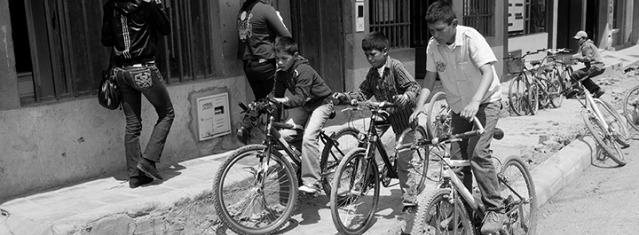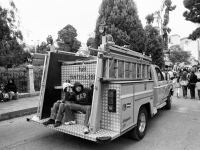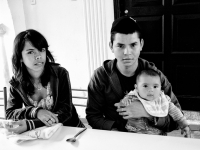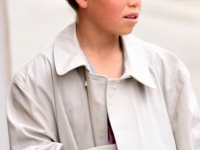Politics
CHILDREN, ADOLESCENTS AND COLOMBIAN JUSTICE: ARE THEY ON THE SAME SIDE?
Human rights and (versus?) politics

Colombia does care for its children? (Source: Roberto Orru©2012)
USPA NEWS -
Everybody seems to care about childhood and youth in general...but how concrete this interest really is? In Colombia there is a huge amount of young people: how is their current state of human rights? United Nations have inspected the topic, and in a few days they will publish their official report.
Colombia is a young country, or maybe it would be better to say that it is a country of young people:
according to the projection of DANE (Colombian Institue of Statystics), in 2013 Colombia has a population of 21,502.755 people under the age of 25.
Of course this means a great potential in terms of general development, at least as long as this population can have access to education and work. Also, as there is not a real development if there is not a real cultural practice in increasing the quality of human rights, it is necessary to have a closer look in this matter.
according to the projection of DANE (Colombian Institue of Statystics), in 2013 Colombia has a population of 21,502.755 people under the age of 25.
Of course this means a great potential in terms of general development, at least as long as this population can have access to education and work. Also, as there is not a real development if there is not a real cultural practice in increasing the quality of human rights, it is necessary to have a closer look in this matter.
The Promotional Committee of the national and international civil society organizations responsable for the elaboration of the Alternative Report to the fourth and fifth Periodic Reports from the Republic of Colombia to the Committee on the Rights of the Child, with the occasion of the Periodic Universal Exam on the state of human rights in Colombia to be carried out this year by the Human Rights Council of the United Nations, has expressed some concerns regarding the situation of childhood and youth rights in the Colombia during the last four years.
The already serious levels of impunity in the country grow worse regarding child
The Colombian state has made advances in harmonizing internal legislation with international standards about the rights of boys, girls and adolescents as well as in defining national public policy directives , from the last exam of United Nations in 2008.Nonetheless, greater coordination is necessary between different territorial entities in order to advance the implementation of plans, programs and projects which affect the rights of childhood and adolescence in accordance with specific contexts. This means that actually exist some State programs whose aim is to increase consciousness about the rights of the youngest part of Colombian population.
These programs and projects sholud also be guaranteed with budgets, operational definition regarding the precise functions of participating authorities, and a strict follow-up from the national government in monitoring progress at the local level, as is laid out in the constitution.
Sadly, often Colombian authorities don´t like to show what effective results they get, but they prefer to show endless lists of activities in progress instead. Also, usually these programs can't count on decent budgets and, most worrying, they often end just because of changes in National and local governments, regardless their progress.
Nowadays, impunity in cases of human rights violations involving children and ad
About the several violations to rights of children and adolescents, the already serious levels of impunity in the country grow worse, including forced recruitment by illegal armed groups, the use of children in militar intelligence by national army or paramilitar groups and guerrilla, and many cases of children´s abuse in several ways.In many cases, processes of investigation and penalization are often unnecessarily delayed,and perpetrators can sometimes, when they are part of Colombian military or civilian authorities, count on the help of prosecutors in implementing strategies and practices designed to cover up responsibility, resulting in impunity.
Illicit Recruitment of underage persons is also going on despite to the official declarations of governments members: Although 5,052 boys and girls formerly involved with illegal armed groups have participated in programs directed by the Colombian Institute for Family Wellbeing since 1999 (according to data given by ICBF itself), resulting in thousands of direct testimonies given to family defenders and psycho-social teams accompanying these programs, only two sentences have been handed down to date in relation to charges of illicit recruitment through the application of the Justice and Peace Law. Thirteen sentences have resulted from the ordinary justice system.
In addition to the small number of sentences given for forced recruitment, sexual violence is almost never mentioned in charges, despite the fact that it is one of the most frequently reported crimes resulting from participation in illegal armed groups as reported by boys and, more often, girls formerly involved in those groups. Of course this is a complicate subject, which cannot be solved only by justice, but with a common effort among state's entities that work to increase children and adolescents' welfare, anyway if the justice system lacks of efficence it is not easy to reach good results in this field.
The Colombian state should strengthen the administration of justice in order to advance investigations, judgments and sanctions against perpetrators of such grave violations against children and adolescents. Sadly, often the national governments just prefer to strenghten the sanctions for specific crimes, but not its administration, resulting in very long processes and, finally, impunity.
It must be said that consciousness about those issues among civil population and grew during these last years. Still, it is not enough, if clear state politics are not applied.
It must be said that consciousness about those issues among civil population and grew during these last years. Still, it is not enough, if clear state politics are not applied.
About criminalization of adolescents
Various initiatives have proposed modifications in recent years to the System of Adolescent Penal Responsibility (SRPA), motivated by the necessity of responding to the participation of children and adolescents in delinquent activities, particularly in the cities of Medellín, Cali and Bogotá. The media have often further magnified the situation, generating stigmatization, especially against adolescents coming from poorer neighborhoods or ethnic minorities.Legislative proposals generally involve increasing penalties and decreasing the legal penal age from 14 to 12 years old. These intentions were codified in Law 1453 of 2011 ““ the Law of Citizen Security, which modified the Infancy and Adolescence Code, broadening the functions of the National Police in regards to internal controls in special attention centers where children and adolescents are held (toughening detention sentences and requiring prisoners to continue to serve out any remaining time even after turning 21 years old).
Young people tried for their involvement with criminal bands are subjected to the full force of the Infancy and Adolescence Code and the Juvenile Justice System, excluding them from the possibility of participating in programs of integral reparation for victims of the Colombian armed conflict.
In addition, some acts formerly regarded as infractions have been converted to crimes, meaning that prison sentences are normally involved. The pedagogical nature of juvenile detention, focusing on re-socialization, teaching and rehabilitation in accordance with international standards has been exchanged for simple punishment. This happens regardless the fact that a child or an adolescent commits crimes always under the influence of adult people.
In addition, some acts formerly regarded as infractions have been converted to crimes, meaning that prison sentences are normally involved. The pedagogical nature of juvenile detention, focusing on re-socialization, teaching and rehabilitation in accordance with international standards has been exchanged for simple punishment. This happens regardless the fact that a child or an adolescent commits crimes always under the influence of adult people.
it is not very clear either how Colombian authorities think to Include the situation of children and adolescents affected by the armed conflict in the present dialogues with armed groups and how to establish a concrete mechanisms for handing over and reinserting young people into society. Given the lack of discussion concerning the situation of children and adolescents affected by the armed conflict in the current dialogues between the Colombian government and the FARC-EP guerrilla group, and taking into account previous processes of this nature which were carried out in the country, it is possible that past errors could be repeated, leaving recruited children and adolescents, particularly those under the age of 15, unidentified at the time of final desmobilization.
Roberto Orrù
PROMOTIONAL COMMITTEE FOR THE PROCESS OF CONSTRUCTING THE ALTERNATIVE REPORT: Corporación Cactus, COALICO,
Corporación Humanidad Vigente, Colombian Jurists Commission, Fedes, Terre Des Hommes ““ Alemania; Platform of social and popular
organizations for the support of boys, girls and young people. More information: Email: protagonismoinfantl@gmail.com Wikispaces: convencion20
PROMOTIONAL COMMITTEE FOR THE PROCESS OF CONSTRUCTING THE ALTERNATIVE REPORT: Corporación Cactus, COALICO,
Corporación Humanidad Vigente, Colombian Jurists Commission, Fedes, Terre Des Hommes ““ Alemania; Platform of social and popular
organizations for the support of boys, girls and young people. More information: Email: protagonismoinfantl@gmail.com Wikispaces: convencion20
Human Rights Adolescence Colombia Latin America Young Childhood Children Child Law Esablishment Politics
Liability for this article lies with the author, who also holds the copyright. Editorial content from USPA may be quoted on other websites as long as the quote comprises no more than 5% of the entire text, is marked as such and the source is named (via hyperlink).










